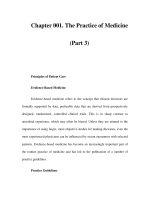Carl gustav jung the practice of psychotherapy (1954)
Bạn đang xem bản rút gọn của tài liệu. Xem và tải ngay bản đầy đủ của tài liệu tại đây (27.11 MB, 402 trang )
132 J95co
v 7*
Rl,
56-O1266
Jung
$4 50
The practice 'of
Psychotherapy
Books will be issued only
on presentation of library card.
Please report lost cards and
change
of
residence promptly.
Card holders are responsible for
all
books, records, films, pictures
or other library materials
checked out on
their cards.
KANSAS
CITY,
MO PUBLIC LIBRARY
D DDD1 QSt,713a 5
BOLLINGEN SERIES XX
THE COLLECTED WORKS
OF
C.G.JUNG
VOLUME
16
EDITORS
SIR
HERBERT READ
MICHAEL FORDHAM,
M.D., M.R.C.P,
GERHARD ADLER, PH.D.
THE PRACTICE
OF
PSYCHOTHERAPY
ESSAYS
ON THE PSYCHOLOGY OF THE TRANSFERENCE
AND OTHER SUBJECTS
C.
G.JUNG
TRANSLATED BY
14
R.
F. C.
HULL
ILLUSTRATIONS
BOLLINGEN SERIES XX
PANTHEON BOOKS
COPYRIGHT 1954 BY BOLLINGEN FOUNDATION INC., NEW YORK,
PUBLISHED FOR BOLLINGEN FOUNDATION INC.
BY PANTHEON BOOKS,
THIS EDITION
IS
INC.,
NEW
YORK, N. Y.
BEING PUBLISHED IN THE
UNITED STATES OF AMERICA FOR THE BOL-
LINGEN FOUNDATION BY PANTHEON BOOKS
INC., AND IN ENGLAND BY ROUTLEDGE &
KEGAN PAUL, LTD. IN THE AMERICAN EDITION, ALL THE VOLUMES COMPRISING THE
COLLECTED WORKS CONSTITUTE NUMBER XX
IN THE BOLLINGEN SERIES. THE PRESENT
VOLUME IS NUMBER l6 OF THE COLLECTED
WORKS, AND IS THE THIRD TO APPEAR.
LIBRARY OF CONGRESS CATALOG CARD NUMBER: 52-8757
MANUFACTURED IN THE U. S. A. BY H. WOLFF
NEW
YORK, N. Y.
N. Y.
EDITORIAL NOTE
This volume contains, in addition to "Psychology of the Transference," published as a separate volume in Switzerland, all Professor Jung's various papers on psychotherapy. Only two works
of importance have not previously appeared in English: "Principles of Practical Psychotherapy" and "Psychology of the Transference." The first contains a new formulation of the analytical
relationship; this formulation Jung calls the dialectical procedure. The second gives the only authoritative statement from
his pen of the way in which the individuation process expresses
itself in the transference.
It was felt that since many will read this volume who may have
not an adequate classical scholarship at their command, a translation of the Latin quotations from little known alchemical texts,
in the final paper, would be of assistance in promoting a deeper
understanding of the material.
bibliography giving details of
the extensive literature has been added; in it a number of English
and American editions of foreign books will be found, though
the translations in these volumes have not necessarily been used
in the text. All bibliographical references are printed in boldface type.
The sources of the translations are given in the table of contents, and further bibliographical details will be found at the
opening of each paper. The Latin and Greek passages were originally translated by Dr. A. Wasserstein and were later somewhat
revised by Dr. Marie-Louise von Franz, whose expert knowledge
of alchemical Latin has been invaluable.
A
TRANSLATOR'S NOTE
Certain of the essays in this volume were previously translated
and published in Contributions to Analytical Psychology
(London and New York, 1928), Modem Man in Search of a Soul
(London and New York, 1933), and Essays on Contemporary
Events (London, 1947). I wish to thank Mrs. Gary F. Baynes
and Miss Mary Briner for permission to make full use of those
texts in preparing the present revised versions. My particular
thanks are due to Miss Barbara Hannah for placing at my disposal her draft translation of the opening chapters of "Psychology
of the Transference/*
It may be noted that two papers, "Some Aspects of Modern
Psychotherapy" and "The Therapeutic Value of Abreaction,"
were written by Professor Jung in English, and are published
here only with certain editorial modifications.
VI
TABLE OF CONTENTS
EDITORIAL NOTE
TRANSLATOR'S NOTE
LIST OF ILLUSTRATIONS
V
vi
xi
PART ONE
GENERAL PROBLEMS OF
PSYCHOTHERAPY
i.
Principles of Practical Psychotherapy
Translated from "Grundsatzliches zur praktischen
3
Psychotherapie," Zentralblatt fur Psychotherapie
(Zurich), VIII (1935).
n.
What
Is
21
Psychotherapy?
Translated from "Was ist die Psychotherapie?/'
Schweizerische Aerztezeitung fur Standesfragen
(Zurich),
in.
XVI
(1935).
Some Aspects of Modern Psychotherapy
29
Originally published in English, Journal of State
Medicine (London),
iv.
v.
XXXVIII
(1930).
The Aims
of Psychotherapy
Translated from "Ziele der Psychotherapie," Seelenprobleme der Gegenwart (Zurich: Rascher, 1931).
36
Problems of Modern Psychotherapy
53
Translated from "Die Probleme der modernen
Psychotherapie," Seelenprobleme der Gegenwart
(Zurich: Rascher, 1931).
vi.
Psychotherapy and a Philosophy of Life
Translated from "Psychotherapie und Weltanschauung," Aufsatze zur Zeitgeschichte
Rascher, 1946).
vii
(Zurich:
76
CONTENTS
vii.
Medicine and Psychotherapy
Translated from "Medizin und Psychotherapie,"
Bulletin der Schweizerischen Akademie der medizinischen Wissenschaften (Basel),
vni.
I
84
(1945).
Psychotherapy Today
94
Translated from "Die Psychotherapie in der Gegenwart/' Aufsdtze zur Zeitgeschichte (Zurich: Rascher,
1946).
ix.
Fundamental Questions of Psychotherapy
1 1 1
Translated from "Grundfragen der Psychotherapie/' Dialectica (Neuchatel),
V (1951).
PART TWO
SPECIFIC PROBLEMS OF
PSYCHOTHERAPY
i.
The Therapeutic Value
of Abreaction
Originally published in English; this
is
129
a revised ver-
from Contributions to Analytical Psychology
(London: Kegan Paul, Trench, Triibner; New
sion,
York: Harcourt, Brace, 1928).
n.
The
Practical
Use of Dream-Analysis
1
39
1
63
FOREWORD
1
64
INTRODUCTION
1
Qtj
Translated from "Die praktische Verwendbarkeit
der Traumanalyse," Wirklichkeit der Seele (Zurich:
Rascher, 1934).
in.
Psychology of the Transference
Translated from Die Psychologic der Ubertragung
(Zurich: Rascher, 1946).
AN ACCOUNT OF THE TRANSFERENCE PHENOMENA
BASED ON THE ILLUSTRATIONS TO THE 'ROSARIUM
PHILOSOPHORUM "
*
viii
203
CONTENTS
EPILOGUE
319
BIBLIOGRAPHY
INDEX
341
IX
LIST OF ILLUSTRATIONS
Figures i-io are full pages, with woodcuts, reproduced from the Rosarium
philosophorum, secunda pars alchemiae de lapide philosophico (Frankfort,
1550). The sections which they pertain to are indicated in brackets.
205
2.
[The Mercurial Fountain]
[King and Queen]
3.
[The Naked Truth]
237
4.
[Immersion in
24 1
5.
[The Conjunction]
247
5a.
[The Conjunction]
249
6.
[Death]
257
7.
[The Ascent of the Soul]
267
8.
[Purification]
273
9.
[The Return of the Soul]
283
1.
10.
[The
New
213
the" Bath]
305
Birth]
3 are full pages reproduced from the textless picture book
in quo tamen iota philosophia hermetica . . . depingitur
(La Rochelle, 1677). They are described on page 320, note i.
Figures
Mutus
1113.
1i
i
liber,
following
320
I
GENERAL PROBLEMS
OF
PSYCHOTHERAPY
PRINCIPLES OF
PRACTICAL PSYCHOTHERAPY 1
Psychotherapy is a domain of the healing art which has developed and acquired a certain independence only within the
last fifty years. Views in this field have changed and become
differentiated in a great variety of ways, and the mass of experience accumulated has given rise to all sorts of different interpretations. The reason for this lies in the fact that psychotherapy is not the simple, straightforward method people at
believed it to be, but, as has gradually become clear, a kind
of dialectical process, a dialogue or discussion between two persons. Dialectic was originally the art of conversation among the
ancient philosophers, but very early became the term for the
process of creating new syntheses.
person is a psychic system
which, when it affects another person, enters into reciprocal
reaction with another psychic system. This, perhaps the most
modern, formulation of the psycho therapeutic relation between
physician and patient is clearly very far removed from the original view that psychotherapy was a method which anybody
could apply in stereotyped fashion in order to reach the desired
result. It was not the needs of speculation which prompted this
unsuspected and, I might well say, unwelcome widening of the
horizon, but the hard facts of reality. In the first place, it was
probably the fact that one had to admit the possibility of different interpretations of the observed material. Hence there
grew up various schools with diametrically opposed views. I
would remind you of the Li6beault-Bernheim French method of
suggestion therapy, reeducation de la volonte; Babinski's "perfirst
A
suasion"; Dubois' "rational psychic orthopedics"; Freud's psychoanalysis, with its emphasis on sexuality and the unconscious;
[Delivered as a lecture to the Zurich Medical Society in 1935. Published as
"Grundsatzliches zur praktischen Psychotherapie," Zentralblatt fur Psychotherai
pie,
VIII (1935):
2,
66-82.
EDITORS.]
GENERAL PROBLEMS OF PSYCHOTHERAPY
Adler's educational method, with its emphasis on power-drives
and conscious fictions; Schultz's autogenic training to name
only the better known methods. Each of them rests on special
psychological assumptions and produces special psychological
results; comparison between them is difficult and often well-
nigh impossible. Consequently it was quite natural that the
champions of any one point of view should, in order to simplify matters, treat the opinions of the others as erroneous.
Objective appraisal of the facts shows, however, that each of
these methods and theories is justified up to a point, since each
can boast not only of certain successes but of psychological data
that largely prove its particular assumption. Thus we are faced
In psychotherapy with a situation comparable with that in
modern physics where, for instance, there are two contradictory
theories of light. And just as physics does not find this contra-
diction unbridgeable, so the existence of many possible standpoints in psychology should not give grounds for assuming that
the contradictions are irreconcilable and the various views
merely subjective and therefore incommensurable. Contradictions in a department of science merely indicate that its subject
displays characteristics which at present can be grasped only
by means of antinomieswitness the wave theory and the cor-
puscular theory of light. Now the psyche is infinitely more complicated than light; hence a great number of antinomies is required to describe the nature of the psyche satisfactorily. One
of the fundamental antinomies is the statement that psyche de-
pends on body and body depends on psyche. There are clear
proofs for both sides of this antinomy, so that an objective
judgment cannot give more weight to thesis or to antithesis.
The existence of valid contradictions shows that the object
of investigation presents the inquiring mind with exceptional difficulties, as a result of which only relatively valid
statements can be made, at least for the time being. That is to
say, the statement is valid only in so far as it indicates what kind
we
are investigating. Hence we arrive at the
which tells us precisely that psychic influence is the reciprocal reaction of two psychic systems. Since the
individuality of the psychic system is infinitely variable, there
must be an infinite variety of relatively valid statements. But
of psychic system
dialectical formulation
if
individuality were absolute in
4
its
particularity, if
one
indi-
PRINCIPLES OF PRACTICAL PSYCHOTHERAPY
vidual were totally different from every other individual, then
psychology would be impossible as a science, for it would consist in an insoluble chaos of
subjective opinions. Individuality,
however, is only relative, the complement of human conformity
or likeness; and therefore it is possible to make statements of
general validity, i.e., scientific statements. These statements relate only to those parts of the psychic system which do in fact
conform, i.e., are amenable to comparison and statistically
measurable; they do not relate to that part of the system which
is individual and
unique. The second fundamental antinomy
in psychology therefore runs: the individual signifies nothing
in comparison with the universal,, and the universal signifies
nothing in comparison with the individual. There are, as we
all know, no universal elephants, only individual elephants.
But if a generality, a constant plurality, of elephants did not
exist, a single individual elephant would be exceedingly improbable.
These
:
logical reflections may appear somewhat remote from
far as they are the outcome of previous
our theme. But in so
psychological experience, they yield practical conclusions of
little importance. When, as a psychotherapist, I set myself
no
up as a medical authority over my patient and on that account
claim to know something about his individuality, or to be able
to make valid statements about it, I am only demonstrating my
lack of criticism, for I am in no position to judge the whole of
the personality before me. I cannot say anything valid about
him except
But since
in so far as he approximates to the "universal man."
be found only in individual form, and I
all life is to
myself can assert of another individuality only what I find in
my own, I am in constant danger either of doing violence to
the other person or of succumbing to his influence. If I wish to
treat another individual psychologically at all, I must for better
or worse give up all pretensions to superior knowledge, all authority and desire to influence. I must perforce adopt a dialec-
procedure consisting in a comparison of our mutual findthe other person
ings. But this becomes possible only if I give
a chance to play his hand to the full, unhampered by my assumptions. In this way his system is geared to mine and acts
upon it; my reaction is the only thing with which I as an individual can legitimately confront my patient.
tical
5
GENERAL PROBLEMS OF PSYCHOTHERAPY
3
These considerations of principle produce in the psychotherapist a very definite attitude which, in all cases of individual treatment, seems to me to be absolutely necessary beis scientifically responsible. Any deviation from
amounts to therapy by suggestion, the kind of therapy whose main principle is: "The individual signifies nothing
in comparison with the universal/' Suggestion therapy includes
all methods that arrogate to themselves, and apply, a knowledge
or an interpretation of other individualities. Equally it includes
all strictly technical methods, because these invariably assume
cause
it
alone
this attitude
that all individuals are alike. To the extent that the insignificance of the individual is a truth, suggestive methods, technical
procedures, and theorems in any shape or form are entirely
capable of success and guarantee results with the universal man
as for instance, Christian Science,
mental healing, faith cures,
remedial training, medical and religious techniques, and countless other isms. Even political movements can, not without
justice, claim to be psychotherapy in the grand manner. The
outbreak of war cured many a compulsion neurosis, and from
time immemorial certain miraculous localities have caused neurotic states to disappear; similarly, popular movements both
large and small can exert a curative influence on the individual.
4
This fact finds the simplest and most nearly perfect expression in the primitive idea of "mana." Mana is a universal medicinal or healing power which renders men, animals, and plants
fruitful and endows chieftain and medicine-man with magical
Mana, as Lehmann has shown, is identified with anything "extraordinarily potent/* or simply with anything impressive. On the primitive level anything impressive is therefore "medicine." Since it is notorious that a hundred intelligent
heads massed together make one big fathead, virtues and enstrength.
dowments are essentially the hallmarks of the individual and
not of the universal man. The masses always incline to herd
psychology, hence they are easily stampeded; and to mob psychology, hence their witless brutality and hysterical emotionalism.
The
universal man has the characteristics of a savage and must
therefore be treated with technical methods. It is in fact bad
practice to treat collective man with anything other than "technically correct" methods, i.e., those collectively recognized and
believed to be effective. In this sense the old hypnotism or the
6
PRINCIPLES OF PRACTICAL PSYCHOTHERAPY
older animal magnetism achieved, in
principle, just as
as a technically irreproachable modern
analysis, or for
that matter the amulets of the primitive medicine-man. It all
depends on the method the therapist happens to believe in. His
belief is what does the trick. If he really believes, then he
will do his utmost for the sufferer with seriousness and perstill
much
severance, and this freely given effort and devotion will have
a curative effect up to the level of collective man's mentality.
But the
5
limits are fixed
by the "individual-universal"
nomy.
This antinomy constitutes a psychological
as well as
anti-
a philo-
sophical criterion, since there are countless people who are not
only collective in all essentials but are fired by a quite peculiar
ambition to be nothing but collective. This accords with all
the current trends in education which like to regard individuality
and
individual
lawlessness as synonymous. On this plane anything
is rated inferior and is repressed. In the correspond-
ing neuroses individual contents and tendencies appear as psychological poisons. There is also, as we know, an overestirnation
of individuality based on the rule that "the universal signifies
nothing in comparison with the individual." Thus, from the
psychological (not the clinical) point of view, we can divide the
psychoneuroses into two main groups: the one comprising collective people with underdeveloped individuality, the other individualists with atrophied collective adaptation. The therapeutic attitude differs accordingly, for it is abundantly clear
that a neurotic individualist can only be cured by recognizing
the collective man in himself hence the need for collective
adaptation. It is therefore right to bring him down to the level
of collective truth. On the other hand, psychotherapists are
familiar with the collectively adapted person who has everything and does everything that could reasonably be required
as a guarantee of health, but yet is ill. It would be a bad misnevertheless very often committed, to normalize
try to bring him down to the collective level.
is
all
In certain cases
possibility of individual development
take,
which
is
such a person and
6
thereby destroyed.
Since individuality, as
we
stressed in
our introductory argu-
absolutely unique, unpredictable, and uninterpretable,
in these cases the therapist must abandon all his preconcep7
ment,
is









